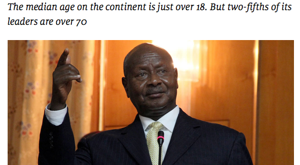The Economist takes on the once-Western-darling. Screen shot from magazine
[Commentary]
Almost the entire commentary excoriating aged despots in African countries in the current issue of The Economist magazine (December 9, 2017 issue) is devoted to Uganda’s U.S.-backed dictator of 32 years in office now, Gen. Yoweri Museveni.
It’s not as if Museveni’s brutal and corrupt regime new, but when a major voice of the white-shoe media such as The Economist makes such blunt observations about a once-Western-darling then it means that the powers that be in Washington and London have concluded that Museveni’s pluses are beginning to outweigh the cost of sustaining him. The burden imposed on Museveni’s victims in Uganda and East and Central Africa, for the benefit of Western interests, has been immeasurably destructive.
The online version of the commentary appears under the headline “Geriatric autocrats–Africa’s ageing leaders don’t know when to quit.”
At 73, and in power longer than “four-fifths of Ugandans have been alive” the Economist observes, Museveni “shows no sign of retirement planning.”
The Economist notes that recently tax drivers surrounded his vehicle to demand that the oppressive monthly fees they have to pay to the city council in the capital, Kampala, to be allowed to operate, be reduced. Even though the dictator promised they would be lowered by one-third by the new year, one taxi-driver, Waiswa Mubarak, told The Economist, “We are still not happy….According to us youths, he has to retire. If he doesn’t, we will force him to.”
Increasingly Ugandans seem more and more determined to remove the despot, whose brutality has caused bloodshed in all parts of the country –South, West, North, East, Central. Since early this year Ugandans in nation-wide popular protests have donned red-attire or bandannas in a campaign called “Togikwatako” which translates into “Don’t you dare touch it.” It’s a warning to the dictator not to force through Parliament an amendment that would lift from the constitution the current age-75-cap for presidential candidates and pave the way for Gen. Museveni to run again in 2021.
The Economist notes that while many in Kampala were excited when Zimbabwe’s Robert Mugabe had to relinquish power Ugandans “wonder whether Mr Museveni will ever leave power unless he is force. Some 75% of Ugandans are opposed to the bill that would let him run again, according to an Afrobarometer poll taken in September. Yet it is being rammed through.”
In a country where per capita income is roughly $663 according to the World Bank, Gen. Museveni has bribed Uganda’s Members of Parliament $8,120 each to ensure that the bill is approved, The Economist reports. This sum is a 12.5 multiple of the average income; going by U.S. average income of $52,000 this level of corruption is the equivalence of Donald Trump paying members of Congress $650,000 each to support a measure he wanted. This is of course another example of the abuse of the $1 billion in U.S. taxpayers’ money that Washington sends every year to the Museveni dictatorship in foreign aid. The dictator infamously purchased a $50 million Gulf Stream jet for his private use. Uganda’s hospitals lack medicines and equipment, so when his daughter was expecting some years back, he had her flown to Germany to deliver the baby.
“As Mr Museveni’s popularity declines, the payoffs needed to keep him in power grow,” the Economist noted. “Since 2002, the number of districts has more than doubled; the number of ‘traditional’ monarchies has grown too. That creates jobs, to be given out in exchange for loyalty. But it also starves the rest of government of money.”
The Economist comments on the recent strike by public-sector doctors who demanded a 10-fold increase in their $308 monthly salaries; prosecutors and nurses are also on strike.
“As services decline, that in turn fuels anger at the government,” adds the Economist, “Eventually, patronage strangles the economy–and shadowy violent sources of power grow more important than the formal state. Already, more people are being arrested. Kizza Besigye, Uganda’s main opposition leader, was at one point charged with treason.”
The Economist notes other arrests, including of editors of the Red Pepper newspaper. “Protests have been put down with gunfire. Political assassinations seem to be becoming more common.”
Museveni seems to “have no plan for succession,” the Economist concludes in its commentary. “If he doesn’t make one, a crisis will eventually come. What then? Ugandans watching events in Zimbabwe are wondering.”
In a nation of over 41 million, the dictator once declared that he’s the only Ugandan with a vision. Hopefully Ugandans can soon eject him from power and give him the time he need to enjoy that vision by himself.







